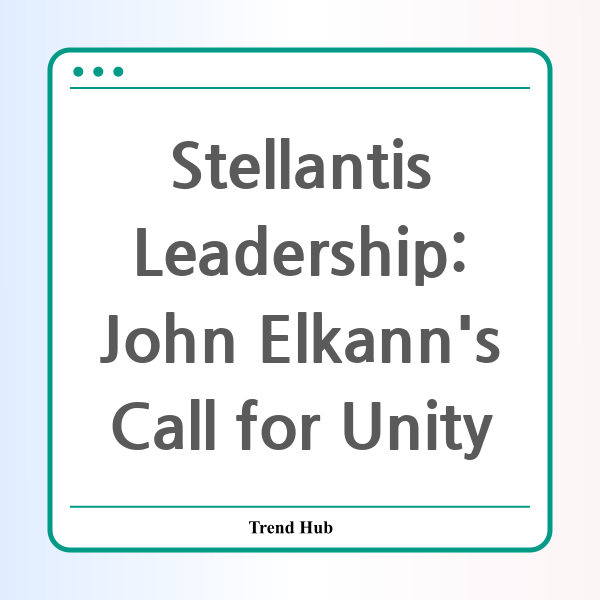* This website participates in the Amazon Affiliate Program and earns from qualifying purchases.

As the automotive industry continues to navigate tumultuous times, the spotlight has fallen on Stellantis Chairman John Elkann, who recently delivered a powerful New Year’s message to his employees. In a time marked by uncertainty and significant leadership changes, Elkann's call for unity resonates deeply with the challenges the company faces. What does this mean for Stellantis moving forward?
In his address, Elkann emphasized the importance of rebuilding trust among employees, management, and stakeholders—trust that has seemingly eroded under the turmoil that accompanied the departure of former CEO Carlos Tavares. The automotive giant, born from the merger of Fiat Chrysler and PSA Group, is currently in a state of chaos, characterized by abrupt adjustments and management decisions that have baffled both employees and industry observers alike.
Just weeks before Elkann's New Year message, news broke of startling layoff announcements at Stellantis' Toledo Jeep factory. In December, the company revealed plans to lay off 1,100 workers at the facility; however, this decision was quickly reversed, adding to the confusion surrounding the company's management strategies. The instability surrounding these decisions can be traced back to Tavares' controversial tenure, marked by a cost-cutting approach that incited significant backlash from the United Auto Workers (UAW).
Tavares’ resignation came amidst rising tensions, particularly following warnings from UAW President Shawn Fein about a nationwide strike should layoffs proceed. This moment marked a pivotal shift in labor relations, indicating a growing power for unions in negotiations with management. The UAW's victory against the layoffs signifies a changing landscape in which labor voices are becoming increasingly influential in shaping corporate policies.
Elkann's leadership now faces the critical task of restoring not only corporate unity but also confidence among the workforce. He is tasked with reaffirming Stellantis’ commitments made in previous labor agreements, which included significant pay increases for workers and promises to invest in new manufacturing facilities. Just a year ago, the company made headlines by agreeing to invest in a sizable $3.2 billion battery plant and a $1.5 billion truck factory, creating a hopeful outlook for future job security and growth.
Moving forward, Elkann's emphasis on unity and collaboration will be essential in establishing a cohesive strategy for Stellantis, especially in light of recent developments. This unity will be crucial as the company seeks to not only stabilize but also innovate within a rapidly evolving automotive market that is increasingly leaning towards electric vehicle technology and sustainability.
Ultimately, the question remains: can John Elkann effectively lead Stellantis back to a path of prosperity by fostering a culture of trust and collaboration? The coming months will be telling as the company strives to navigate its internal challenges while maintaining its position in a competitive global market.
* This website participates in the Amazon Affiliate Program and earns from qualifying purchases.